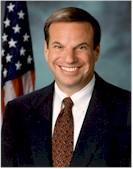 ...he's the U.S. Representative for California's 51st District, which includes the southern chunk of the city of San Diego and stretches eastward along the US/Mexico border all the way to where California meets Arizona at the Colorado River. I just discovered Filner last year, and he is one of my favorite players in politics - one of the most persuasively progressive voices in the House, and the type of person whose background and positions strike me as embodying precisely what I want in a politician.
...he's the U.S. Representative for California's 51st District, which includes the southern chunk of the city of San Diego and stretches eastward along the US/Mexico border all the way to where California meets Arizona at the Colorado River. I just discovered Filner last year, and he is one of my favorite players in politics - one of the most persuasively progressive voices in the House, and the type of person whose background and positions strike me as embodying precisely what I want in a politician.I've seen Filner speak on two occasions; he spoke intelligently, and with charisma, and I'm growing to like his writing, as well. Here's an excerpt from a recent editorial on health care for veterans he penned for The Nation:
A decade ago American veterans' healthcare system had become notorious for its deteriorating facilities and mediocre quality of care. It was no way to treat our veterans. But under President Clinton the VA system underwent a sea change. Where it had mainly offered inpatient care in often dirty, antiquated hospitals, the VA system was rebuilt to focus on outpatient care in modern clinics built in locations readily accessible to veterans. Equally important, eligibility requirements were changed so that every veteran could enroll. The number of patients doubled to nearly 5 million a year, and the quality of care rose with it.
By 2003 a study in The New England Journal of Medicine found that veterans' healthcare, once ridiculed by conservatives as a travesty of "socialized medicine," had come so far that it equaled or surpassed the quality of even the most expensive private healthcare systems in America. VA healthcare had transformed into a promising model for a full-scale public healthcare system.
In the full article, Filner goes on to note that, in contrast with Clinton's budgets, President Bush's spending plans have stopped well short of fully funding the VA system, which sure seems like a strange way to "support the troops," and could be related to the VA's success as a publicly financed and managed healthcare program. Filner also endorses a recently introduced bill that would ensure the VA system is adequately funded from year to year.
